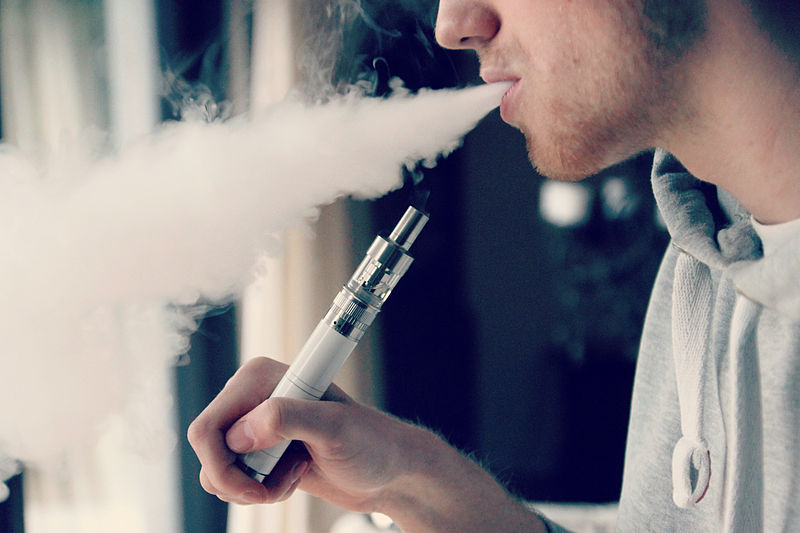The dangers of e-cigarettes affect the youth
Everyday more information is being discovered on vaping and its negative effects on the young body.
This man is using an e cigarette, participating in vape culture.
October 22, 2019
A district-wide meeting about the use of e-cigarettes was hosted out of concern for students in light of new information regarding vaping and drug use as a whole.
“The point of this is keeping our campus and kids safe,” Niethamer said.
The meeting started off discussing the basics of e-cigarettes, such as the origins of e-cigarettes, the flavors they come in and their many appearances. PISD substance abuse prevention specialist Dawne Niethamer stated that while the original campaign for vaping seemed innocent, the one that stated that e-cigarettes were created to help long time smokers quit smoking, the truth of the matter is that e-cigarettes were designed for minors.
Niethamer discussed different types of e-cigarettes like the suorin, the mod, the stone boy and of course, the JUUL. In addition to this, stated that her primary reason for thinking that e-cigarettes are being marketed towards minors is the fact that they come in juvenile flavors like Candy Cane and Gummy Bears as well as many others.
A major issue Niethamer spoke about is the ignorance people have regarding the e-liquid and just how much nicotine is being put into the users’ bodies when they vape it.
“One these pods equals the same amount of nicotine as smoking one pack of cigarettes,” Niethamer said.
However, nicotine is not the only chemical that was discussed. At the seminar, there were also talks about THC, a chemical extracted from the marijuana plant, which is also commonly found in e-cartridges.
According to Sergeant Paul Malcom at the Plano Police Department’s narcotics division, there is up to 95 percent THC in e-liquid cartridges, which, contrary to popular belief, can cause overdoses. This is because of the concentration of the oil, which makes the effects of the chemical more powerful.
Panelist Dr. Micheal P. Kilgard, a professor of behavioral and brain sciences at the University of Texas at Dallas explained how addictive substances impact the growth and development of the brain.
Kilgard stated that since the human brain is still developing well into the mid-’20s, it is especially crucial for people below that age range to avoid any addictive substances, as it kills neural connections in the brain that assist in learning. These connections allow for the further development of the frontal lobe, which is the last part of the brain to develop and controls behaviors like empathy and altruism.
While it was originally believed that vaping would kill brain cells and cause inattentive and hyperactive teens due to the destruction of brain matter, this has not happened.
“We originally thought [the vaping] epidemic would leave us with a bunch of zombie children running around, but it didn’t turn out that way,” Kilgard said.
For those who are already addicted, however, he reassures that those connections can grow back, although it will be challenging.
According to Niethamer, since it takes about five years to gather accurate data, the statistics relating to vaping related illnesses and deaths were previously inaccessible to people like herself trying to inform teens about vaping. Now, however, enough time has passed, and illnesses are starting to be reported, most of which have never been seen before.
“As of [Sept. 24], there were 54 illnesses [reported] in Texas, 22 of which were in North Texas,” Niethamer said.
The study done by the Mayo Clinic and published in the New England Journal of Medicine reported that there have been 21 vaping related deaths and 1100 lung injuries as of Oct. 4. While it was thought that Vitamin E, an ingredient found in dangerously high amounts in e-liquid, may be linked to the steady incline in illnesses and deaths, the aforementioned study said that this is likely not the case, but that they are uncertain of what the cause may be. However, the study did say that vaping related injuries cause scarring equivalent to pouring acid on to your skin.
In the state of Texas as a whole, any person under the age of 21 will face criminal charges if found with e-cigarettes or e-liquid cartridges. This new law, according to Niethamer, will hopefully cause the number of illicit substances seen on students to go down.
Any person on Plano ISD property can face criminal charges for possession of any narcotic substances. Regardless of age, anyone found with any about of THC on PISD property will be charged with a felony. Nicotine possession will cause lesser charges, but will still result in legal persecution.
“There is no such thing as a safe vape,” Niethamer said.







